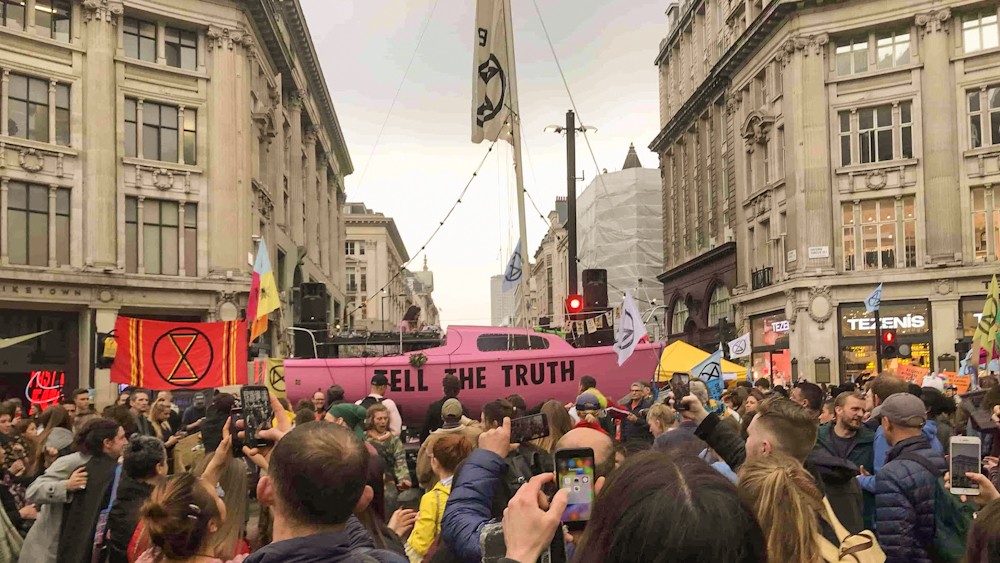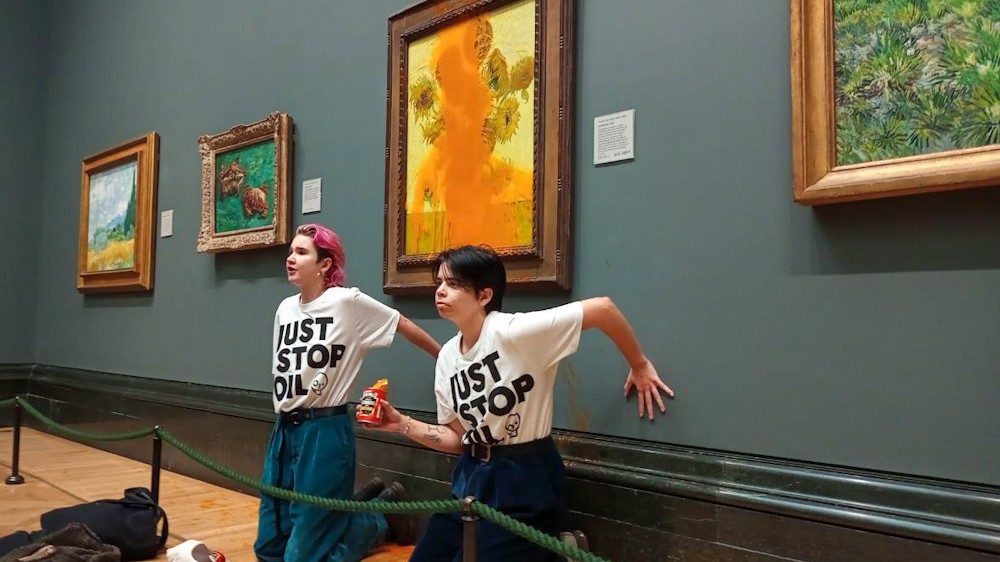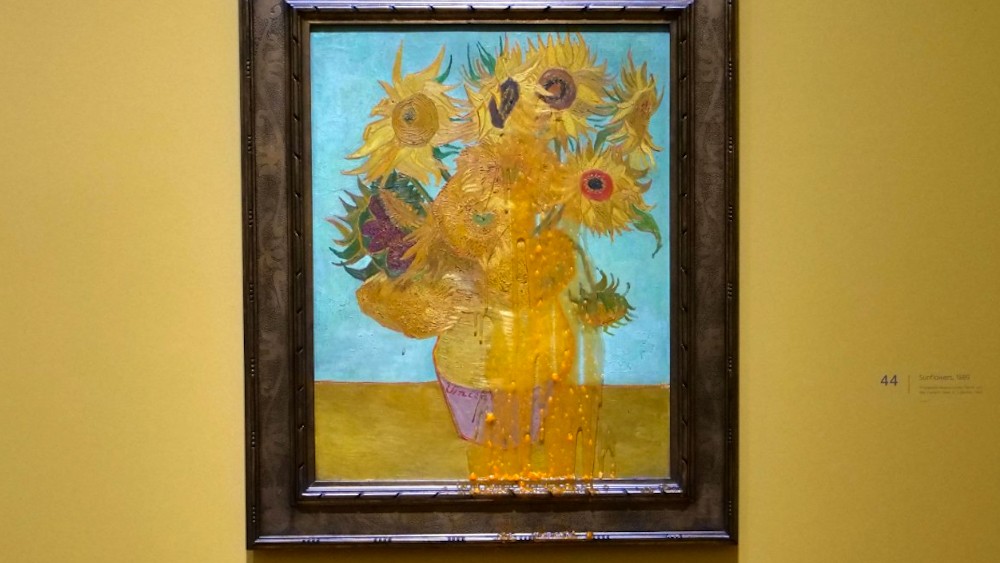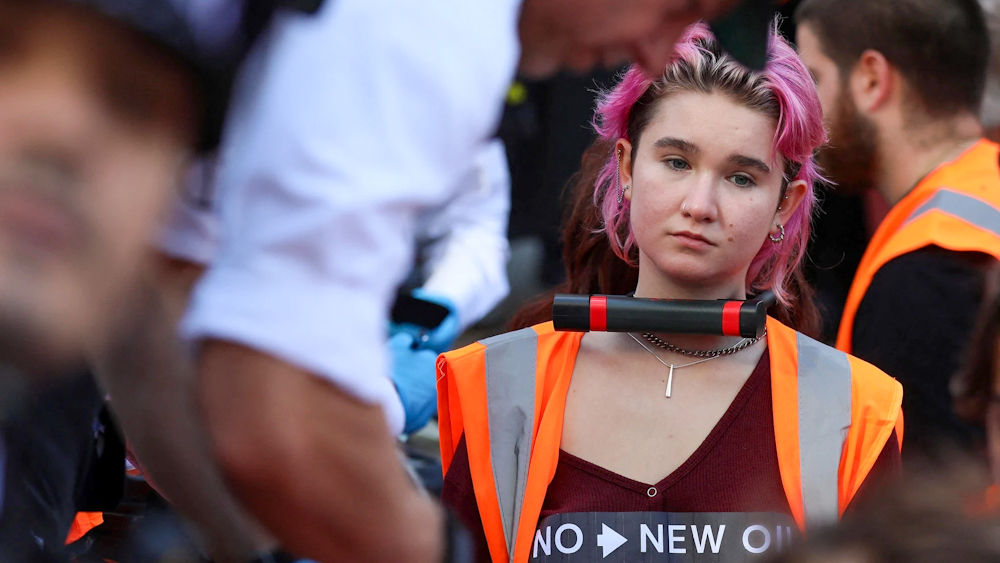Three years after hurling tomato soup at a masterpiece, Phoebe Plummer discusses the shutdown of Just Stop Oil, the importance of doing something real, and the future of direct-action protest.
They were running late. London traffic crawled along, a thick gridlock in the inner city. Horns blared. Engines idled. Phoebe Plummer, then a student, sat restless in their car, frustrated. Sirens whined in the distance. Far ahead, beyond a wall of police, a crowd had blocked the road – banners, chants, drums, a bright pink boat. It was 2019, and Extinction Rebellion had taken over the capital, beginning their ‘April Rebellion’ protest wave.
“I remember thinking, what are these people doing?” Plummer recalls. Soon after, they went home and researched the group, stumbling onto their singular demand, a declaration of climate emergency. Then, after reading the latest United Nations report on climate change, the conclusion became clear, earth was heating up, and catastrophe would follow. “It felt a little like my world was falling down around me. I thought, fuck! It’s this huge crisis.”
“I don’t remember ever learning about the climate crisis,” she says. “the way it was spoken about, I didn’t think there was anything to worry about. I thought the grown-ups were in charge, that they had it all in control. I thought we were talking about stopping using plastic straws to save the turtles. I had this visceral reaction to all the systems we depend upon, I felt betrayed… lied to.” That feeling of betrayal sparked an urgency to act, igniting a transformation in Plummer. They would go from a curious passer-by, looking on as others demanded change, to stepping up and taking action themself, accidentally becoming one of Britain’s most infamous climate protesters.

The Souping
The leap from watching a protest in gridlocked traffic, to staging one of the most controversial climate stunts in recent memory wasn’t sudden. Following Plummer’s first encounter with Extinction Rebellion, they began reading everything they possibly could about the climate crisis, attended eco-science lectures, and began joining protests of their own, participating in multiple Extinction Rebellion gatherings, slow marches, sit-ins, and stunts.
But, after three years in the movement, they began to grow disillusioned, frustrated by the lack of action after all their work. “For me it was the logical thing of ‘look you’ve tried all of those nice ways for three years. They blatantly don’t work; they were never going to work. You were kidding yourself because you didn’t want to take the risk’. As a result, Plummer began looking elsewhere, turning towards a more radical group just beginning to gain steam – Just Stop Oil.
But it was October 2022 that they truly made their name, when Plummer and fellow JSO activist Anna Holland walked into room 43 of the National Gallery, emptied a can of Heinz tomato soup on Vincent Van Gogh’s revered masterpiece ‘Sunflowers’, and glued themselves to the gallery wall.
Eyes locked on an outraged crowd, they began to shout, “What is worth more – art or life? Is it worth more than food or justice?”

The action went viral almost instantly, becoming one of the highest-profile protests in British history, discussed on almost every media platform, from the front page of the morning newspapers to discussion pages across social media. Overnight, Plummer was famous. “We knew it was designed to be media-grabbing,” Plummer recalls “but we had no idea it would take off like it did. I was wildly unprepared for how it would change my life.”
The Sun branded both activists “eco-loons.” The Telegraph went further, labelling them “Just Stop Oil’s moral toddlers”, referring to a quote by American writer Robert Tracinski, who said of society “we have fostered and indulged a sort of moral toddlerhood.” Social media users fixated on Plummer’s background, slamming their private school education. Plummer, it turned out, grew up in a multimillion-pound Chelsea townhouse, attended the elite £50,000-per-year St Mary’s School, and aced their A-Levels at a top Kensington sixth form. A path to career success and comfort lay ahead of her. Yet, here she was, taking part in one of Britain’s most controversial climate stunts.
Whilst heavily critiqued at the time, Plummer maintains the message was urgent, and that their actions were entirely rational, “I may have thrown soup on a painting, but actually, I don’t think we were doing crazy things. I think we were acting accordingly to the crisis we’re facing.”
The painting was not damaged as it had a glass cover, a fact known to the activists, although there was damage to the frame, a point critics piled onto. For some, the action was a disgrace, a deliberate attack on art and cultural heritage. According to BBC News, Judge Christopher Hehir told the activists they “came within the width of a pane of glass of destroying one of the most valuable artworks in the world.” Prosecutors also testified that the frame, “a piece of art in itself,” was damaged as a result of the protest.
For supporters, it was a much-needed wake-up call to a planet on fire. During the trial for their Sunflowers action, 125 artists appealed to the judge in an attempt to reduce sentencing, likening the act of the protest itself to a form of performative art. The statement read, “We are concerned by the courts’ defence of a false notion of artistic purity in their judgement and sentencing. Art can be and frequently is, iconoclasm. These activists should not receive custodial sentences for an act that connects entirely to artistic canon.”
The action was about visibility, its goal not to spark a revolution or gather public sympathy, but to force a singular message into the public consciousness, just: stop oil. “Fossil fuel licensing simply wasn’t in the public debate,” they say. “it was an obscure bureaucratic process going on behind closed doors. We actually made that a topic of conversation and made it politically impossible for Labour to keep issuing these licences.”
Going Viral
The soup protest grew to an unexpected virality, forcing Plummer into the eye of the British media, and the online social sphere. They admit to struggling with the onslaught of attention. “I did really struggle with the media side at first. I’ve always said I didn’t mind the legal consequences, because I’d served the worst bit of the sentence in the media.”
Online, the abuse quickly turned from general contempt to personal abuse. “A lot of the stuff online is really quite vitriolic,” they say. “and I think what I struggled with most, Anna and I being young, fairly female-presenting, and queer, was that it turned into misogyny and homophobia almost instantly, which is to be expected. But I just found… disappointing.”
“I wish people were more creatively insulting. Then at least I could respect the online hate.”1
The toll led Plummer to quit social media entirely, turning to her close friends and family for support. “; I have no desire to. I realised it’s not a very nice place to be. In person, I had a huge amount of support and love, that far outweighed a bunch of hateful Twitter trolls.”

Behind Bars
For their role in multiple actions, Plummer served over 250 days in HMP Bronzefield, the largest women’s prison in Europe, located on the fringes of London. They arrived with pre-conceptions of prison, fearing life on the inside. “When I went to prison for the first time, I was really scared. I thought, ‘ah shit, what have I done? Maybe I can’t hack this.’ but that cleared up quickly. I’d wake up every morning and drink shitty prison coffee with people I loved. And after the first morning doing that, I thought: this is fine.”
Prison shattered their illusions of incarceration. “We all grow up with this myth of prison—that it’s this horrible and scary place. We are told that if you go to prison, you must be bad and scared, because that’s where the ‘bad’ people are. And that’s so far from true. I saw very much that prison is a place for people who are actually just inconvenient to society.”
Through it all, Plummer found strength in the Just Stop Oil community. “I’ve genuinely never been happier in my life. These people exude more love and care and goodness than anyone I’ve ever known. They’ll support me through anything.”

The Radical Flank
For Plummer, climate protest and social liberation are deeply intertwined with identity. They see their queerness and politics as inseparable, rooted in the same fight for collective liberty and justice. “Being female and queer, I understand that the rights I have came from people who didn’t just sign petitions.”1
They never saw Just Stop Oil as a popular front designed to persuade people, its goal was something else, to push once-outlandish ideas (such as banning new oil and gas licenses) into the public consensus. “I always saw our role as the radical flank,” they say. “not to mobilise the masses like Extinction Rebellion, but to push the Overton Window, shifting what’s acceptable in public debate.” The Overton Window referring to the sphere of political ideas generally accepted by the public.
Upon gaining power, Labour announced it would stop allowing new oil and gas licenses, a success for Just Stop Oil. In response, just a few months later, in April, the group announced its disbandment and called for an end to its disruptive actions, but Plummer believes Just Stop Oil has left a hole that must be filled, “I think now there is an interesting space in the climate movement, which was that radical flank that Just Stop Oil held. I think the people involved in Just Stop Oil will carry on in resistance one way or another. I now would find it inconceivable to go back to a quiet life, knowing what I know and knowing the and power and agency that comes with activism.”
They link new government legislation to suppress protest, like the Public Order Act (introduced in 2023 the Public Order Act criminalises ‘locking-on’, and several other disruptive protest tactics) to corporate interests such as oil companies attempting to silence dissent and suppress protest. They openly critiqued the policy, saying, “Rishi Sunak admitted it was drafted by Policy Exchange, a think tank funded by ExxonMobil. These laws target climate activists, and it’s not a coincidence.”
Crackdown and Solidarity
Recently, the government legally proscribed Palestine Action as a terrorist group, illustrating a further descent into state suppression of protest. Many JSO members also work within Palestine Action, so the move hit Plummer hard. “I feel quite deeply impacted by the calls to proscribe Palestine Action,” Plummer turns away, regaining their composure for a moment. They speak slowly, emotions welling “I was in prison with many people from Palestine Action, from the Filton 18, who’ve had terror legislation used against them. And knowing those people, and how brave they are, and how brilliant, and how loving… I think that’s the thing that upsets me the most.
“Trying to prevent a genocide is an act of love, and to see that twisted into being called terrorism, when it’s the state that’s funding and supporting this war in the Middle East where thousands upon thousands of innocent people are dying…. Yeah, I’m finding it really upsetting to see at the moment.”
Resistance Persists
The stakes, Plummer believes, are too high to stay silent. She encourages those who feel helpless to stand up and take action “It’s so easy to be immobilised by all the fear and rage and grief at the climate crisis and government inaction to tackle it—and that all those are really rational human responses.”
“The best way I’ve found to deal with that isn’t to try and ignore it or run from it, but to channel those feelings into doing something real about it. Doing that will help you deal so much with all of the very real feelings that come with acknowledging the crisis of the reality we face.
They were recently spared another prison sentence, instead given 150 hours of community service and fines. Outside court, they said: “Perhaps by not sending me to prison today, the courts have realised that draconian sentences are not working to deter people from resistance. How could it, when the alternative is to passively accept the death and suffering of hundreds of millions of innocent people as a result of climate inaction?”
Today, Plummer stands at a crossroads. “I’m figuring out where I take my resistance next.” But one thing is certain: “I feel joyous. I feel lucky that I get to do this with my life.”
They offer a final word of encouragement, for anyone inspired to take action. “If someone had told me I’d go to prison three times and speak on national TV, I’d have laughed. But I think most people are braver than they know. Channel that fear and grief into something real. You might find a lot more love and joy in it than you expect.”
